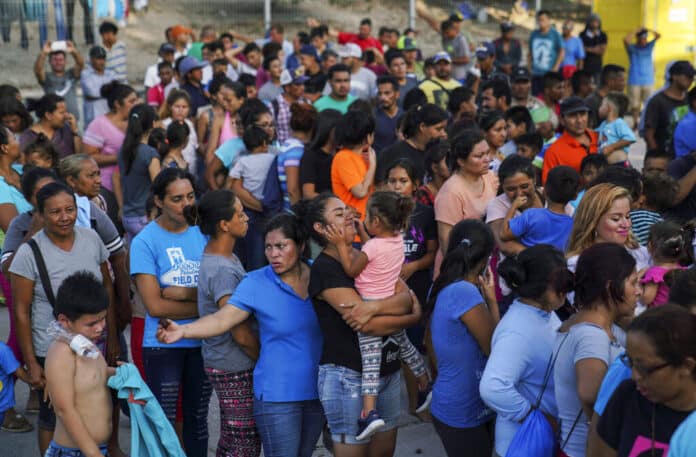
McAllen city leaders are scheduled to meet with federal health officials Wednesday following a call from the White House regarding the release of asylum seekers.
Mayor Jim Darling told city commissioners he received a call from the White House on Friday to discuss the release of migrant asylum seekers waiting in Mexico under the Migrant Protection Protocols, or MPP, program.
Implemented by the Trump administration, the program forced migrants to stay in Mexico while they awaited their immigration court hearings in the U.S.
“It was kind of surprising that the White House didn’t know what was happening here,” Darling told the city commissioners about his phone call with the White House on Friday. “They’re more concerned about the release of the MPP people, the people that have been in camps down there that are waiting for their hearing.”
“They were trying to clear those camps out without, I think, understanding the total numbers that were coming across as asylum seekers,” Darling said.
After the Biden administration put a halt to the MPP program, U.S. Border Patrol released hundreds of asylum seekers who were never placed into MPP to begin with. Many are released to the Humanitarian Respite Center in McAllen run by Catholic Charities of the Rio Grande Valley or are dropped off at the city’s bus station.
“We’re getting anywhere between 200 and 300 a day,” Darling said. “When they had the freeze, there were no buses running, obviously, because of the weather conditions so we had over 800 people in the respite center at one time. Got pretty close to 1,000, I think.”
Darling added the city had provided generators and heaters there due to the freezing temperatures last week and, prior to that, had provided and continued to provide COVID-19 rapid tests for those coming into the center.
What the city is concerned with, Darling said, is ensuring the city is reimbursed for the resources they’ve deployed.
“We informed them we’re trying to make sure we get reimbursed out of FEMA (Federal Emergency Management Agency) directly or from the federal government,” Darling said. “We’re told they have money, they just don’t have a mechanism to get to us because you need an appropriations bill or something.”
After the commissioners meeting, Darling said he couldn’t specify from which federal agency the health officials worked but said the likely purpose for their visit was due to concerns about the health of the people being released into the city and what the city is doing about it.
“Our main concern is the same thing as theirs: making sure that we’re not having people released into the city that have COVID,” he said. “COVID’s a little different than what we’ve normally been handling with the federal government.”
Darling told commissioners that although they’ve likely had a couple thousand asylum seekers come through, they’ve only had two cases of COVID-19 among them.
The individuals who tested positive were quarantined in another facility run by Catholic Charities of the Rio Grande Valley, whose work Darling praised.
“Catholic Charities is obviously coming to the front again and doing a great job,” Darling said. “They’re handling the bulk of what’s going on, we’re more like a resource for them and we think that’s our obligation, it is our city and our bus station.”
For years, the city has struggled to receive reimbursement from the federal government for their expenses on migrant aid. The current situation, he said, was like deja vu, though a little different because of the pandemic.
“(We’ll) keep track of our expenses, keep meeting with them and hopefully get reimbursed, not only for the city but also … Catholic Charities,” Darling said. “But we’ll see.”



